|
|
|
Sort Order |
|
|
|
Items / Page
|
|
|
|
|
|
|
| Srl | Item |
| 1 |
ID:
155057


|
|
|
|
|
| Summary/Abstract |
Why do states facing high levels of international threat sometimes have militaries that are heavily involved in government and at other times relatively apolitical, professional militaries? I argue that the answer to this puzzle lies in a state's history of acute international crises rather than its chronic threat environment. Poor outcomes—defeats or stalemates—in major international crises lead to professionalization and depoliticization of militaries in both the short- and long-term. A poor outcome creates pressure for military professionalization and withdrawal from politics in order to increase military effectiveness. This effect persists years later due to generational shifts. As officers of the “crisis generation” become generals, they bring with them a preference for professionalization and guide the military towards abstention from politics. I test this theory using a new global dataset on military officers in national governing bodies from 1964–2008 and find strong support for it.
|
|
|
|
|
|
|
|
|
|
|
|
|
|
|
|
| 2 |
ID:
157104


|
|
|
|
|
| Summary/Abstract |
This article contributes the insight that during an international crisis, a pre-existing state of complex interdependence can help to preserve cooperation. It derives the insight from a case study on the International Relations of the Arctic before and after the 2014 Russian annexation of Crimea. The case study is examined through the lens of Robert Keohane and Joseph Nye’s concept of ‘complex interdependence’, as developed in their 1977 book Power and Interdependence – a concept which provides the analytical breadth necessary for a multifactorial situation of regional cooperation and conflict. It finds that Arctic international relations had achieved a state of complex interdependence by 2014, and that some important elements of interdependence then disappeared after the annexation of Crimea. But while most military and economic cooperation between Russia and Western states was suspended, many aspects of regional cooperation continued, including on search and rescue, fisheries, continental shelves, navigation and in the Arctic Council. The question is, why has Arctic cooperation continued in some issue areas while breaking down in others? Why have Russian–Western relations in that region been insulated, to some degree, from developments elsewhere? The concept of complex interdependence provides some answers.
|
|
|
|
|
|
|
|
|
|
|
|
|
|
|
|
| 3 |
ID:
146146
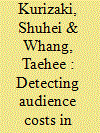

|
|
|
|
|
| Summary/Abstract |
Selection effects in crisis bargaining make it difficult to directly measure audience costs because state leaders have an incentive to avoid incurring audience costs. We overcome this inferential problem of selection bias by using a structural statistical model. This approach allows us to estimate the size of audience costs, both incurred and not incurred, in international crises. We show that although audience costs exist for state leaders of various regime types, democratic leaders face larger audience costs than nondemocratic leaders do. Audience costs can be so large that war might be preferable to concessions, especially for leaders of highly democratic states. Audience costs also increase a state's bargaining leverage in crises because the target state is more likely to acquiesce if the challenge carries larger audience costs. We also find evidence that audience costs generate selection effects.
|
|
|
|
|
|
|
|
|
|
|
|
|
|
|
|
| 4 |
ID:
178803


|
|
|
|
|
| Summary/Abstract |
Poland and Lithuania are young and strategically inexperienced
countries that do not fully understand the consequences of their
actions. Their goal is to undermine Belarus internally, to deprive
it of its status of agency in international affairs, and to make use of its
resources and the outflow of people that may occur as a result of the
crisis, writes Valdai Club Program Director Andrei Sushentsov.
|
|
|
|
|
|
|
|
|
|
|
|
|
|
|
|
| 5 |
ID:
170032


|
|
|
|
|
| Summary/Abstract |
Theories of crisis (de-)escalation often focus on conflict, stress, and information problems. However, crisis (de-)escalation may sometimes hinge on how de-escalation is interpreted by domestic audiences. In this article, I combine Putnam's two-level games model of diplomacy with Erving Goffman's concepts of interaction order and face to create a mechanism I call “diplomatic presentation.” I show how diplomatic presentation can be instrumental for the crafting of diplomatic outcomes that states believe are in their mutual interest but that run the risk of being rejected by their domestic publics. Successful diplomatic presentation requires that states collude together to manage their performance, engage in teamwork, and control the impact of unsympathetic audiences. In evaluating this mechanism, I analyze the diplomacy surrounding the Iran Hostage Crisis. During this crisis, regime officials from the United States and Iran colluded in a theatrical “scenario,” in which both sides adopted specific roles in order to satisfy the sentiments of US and Iranian publics. I show that complications regarding the presentation of this scenario explain escalation of the crisis better than prominent alternatives. This argument contributes to the growing literature on symbolic diplomacy in international relations, while also challenging common assumptions about the adversarial nature of crises.
|
|
|
|
|
|
|
|
|
|
|
|
|
|
|
|
| 6 |
ID:
157801


|
|
|
|
|
| Summary/Abstract |
We investigate the effect of ethnic pluralism on mediation in interstate and internationalized civil crises from 1945 to 2010. We find that mediation succeeds when two conditions are met. First, success is more likely when there are fewer disenfranchised ethnic groups in the disputant population, because these groups are usually excluded from peace talks and often use violence to challenge peace. Second, mediators are more likely to succeed when politically included disputants, usually present at peace talks, comprise various different ethnic groups. Because such groups, numerous as they are, pull and tug for dominance at peace negotiations, they are unable to form decisive coalitions. As a result, third parties have a chance to serve in a more authoritative role and influence a settlement.
|
|
|
|
|
|
|
|
|
|
|
|
|
|
|
|
| 7 |
ID:
112748
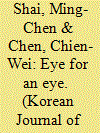

|
|
|
|
|
| Publication |
2012.
|
| Summary/Abstract |
Although signaling is the essence of diplomacy, it has often been overlooked in
previous studies on international crises. In fact, whether states in a dyad escalate
disputes to the brink of war or seek conflict resolution, both sides of a crisis use
these forms of signaling to convey their intended messages and possible responses.
However, in most of these dyadic international conflicts, the patterns of signaling
motives are not identified. In this article, it is argued that signaling decisions
depend on the interaction of contextual dimensions, perceived threats, and the
status disparity facing the states in a dyad. By analyzing both the signaling and
the counter-signaling of nations in dyadic interactions, an alternative insight is
offered into why the Korean War turned out to be inevitable.
|
|
|
|
|
|
|
|
|
|
|
|
|
|
|
|
| 8 |
ID:
087731
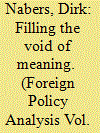

|
|
|
|
|
| Publication |
2009.
|
| Summary/Abstract |
The paper aims to shed light on the conceptual link between international crises such as the one following September 11, 2001, and processes of identity construction through foreign policy. Crisis and identity construction are conceptualized as constant political phenomena. The political process is constituted by meaningful acts of social agents, and can thus only be grasped by analyzing meaning. Meaning is transmitted by language. Meaningful language is never reducible to individual speakers; it is a social act. The sum of articulatory practices in a social field is called discourse. Linking Critical Discourse Analysis (CDA) with the theory of hegemony developed by Ernesto Laclau and Chantal Mouffe, I will be able to show how hegemonic discourses serve as the nexus between the discursive construction of crises and identity change. A number of problems will be acknowledged when linking these two strands of thinking, as CDA and Laclauian theory work with tentatively different conceptions of discourse. The construction of the "war on terror" by the Bush administration between September 2001 and May 2003 is used as a case to illustrate the theoretical argument.
|
|
|
|
|
|
|
|
|
|
|
|
|
|
|
|
| 9 |
ID:
156805


|
|
|
|
|
| Summary/Abstract |
The profound political uncertainties in international politics created by developments in the United States, Europe, the Middle East, and North Korea (DPRK) are similar in some respects to the economic uncertainties created by the global financial crisis of 2008. In both crises there is a sudden and general awareness of vulnerability, and it is unclear how long the current uncertainty will last. With the election of Donald Trump, the United States is again at the centre of a global crisis. China is again the least vulnerable of the major states. Everyone including China is disadvantaged by the current political crisis. However, in relative terms China stands to gain, as it did in 2008. The relative change in international relationships will be most obvious in Asia. The focus here is on the cycle of uncertainty that characterizes both crises. However, the effects of the current political crisis are likely to contrast with the effects of the earlier economic crisis. From 2008 to 2014, other countries were worried about their own economies and about the world economy in general, and also about what China’s arrival as a regional and global economic power might mean for them. Meanwhile, American leadership under Obama seemed less assertive, while China appeared to be more assertive. By contrast, in 2015, China’s economy had already entered a ‘new normal’ of slower economic growth, while its consolidated political leadership supports multilateral globalization. American political leadership is unpredictable in both general strategic terms and in terms of crisis management. Just as the world needed the economic lift provided by China in 2008, it now needs the political reassurance of stability that China appears to provide. However, the United States may find it difficult to adjust to the shift in political influence.
|
|
|
|
|
|
|
|
|
|
|
|
|
|
|
|
| 10 |
ID:
037416


|
|
|
|
|
| Publication |
Hants, Saxon House, 1978.
|
| Description |
vi, 154p.
|
| Standard Number |
0566001861
|
|
|
|
|
|
|
|
|
|
|
|
Copies: C:1/I:0,R:0,Q:0
Circulation
| Accession# | Call# | Current Location | Status | Policy | Location |
| 017804 | 327.17/FRE 017804 | Main | On Shelf | General | |
|
|
|
|
| 11 |
ID:
115201
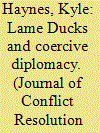

|
|
|
|
|
| Publication |
2012.
|
| Summary/Abstract |
The literature on "audience costs" in International Relations suggests that a democratic leader's electoral accountability lends him or her a significant advantage in crisis-bargaining situations. But if elections are the primary source of a democratic leader's accountability, a democracy's advantage in crisis situations should disappear when its leader is no longer eligible for reelection. Accordingly, this article asks whether "lame-duck" presidents, those who are constitutionally prohibited from reelection, are systematically less effective than their reelectable counterparts in crisis-bargaining situations. Using a data set of all post-World War II militarized interstate disputes initiated by presidential democracies, the author tests several hypotheses regarding lame-duck crisis behavior derived from Fearon's bargaining model. The findings generally support the audience costs model. Observed patterns of threat reciprocation and crisis hostility are consistent with Fearon's predictions. Crisis outcomes, however, do not appear to be affected by a democratic leader's lame-duck status.
|
|
|
|
|
|
|
|
|
|
|
|
|
|
|
|
| 12 |
ID:
125134
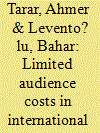

|
|
|
|
|
| Publication |
2013.
|
| Summary/Abstract |
Do audience costs have to be extremely large in order to credibly signal resolve and affect international crises? Existing theoretical work on audience costs suggests an affirmative answer, and recent empirical work on audience costs focuses on whether a leader can generate such large audience costs as to create a commitment to fight where no such commitment previously existed. We analyze a richer crisis bargaining model with audience costs and find that (1) audience costs can have war-reducing effects on incomplete-information crisis bargaining through a noninformative, bargaining-leverage mechanism and (2) audience costs can have war-reducing effects even when such large audience costs are not being generated as to create a commitment to fight where no such commitment previously existed. Even more limited audience costs can have war-reducing effects in international crises. We discuss how the bargaining-leverage mechanism is consistent with a number of prominent historical cases
|
|
|
|
|
|
|
|
|
|
|
|
|
|
|
|
| 13 |
ID:
145703
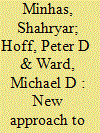

|
|
|
|
|
| Summary/Abstract |
Previous models of international conflict have suffered two shortfalls. They tend not to embody dynamic changes, focusing rather on static slices of behavior over time across a single relational dimension. These models have also been empirically evaluated in ways that assumed the independence of each country, when in reality they are searching for the interdependence among all countries. A number of approaches are available now for analyzing relational data such as international conflict in a network context and a number of these can even handle longitudinal relational data, but none are developed to the point of exploring how networks can coevolve over time. We illustrate a solution to the limitations of existing approaches and apply this novel, dynamic, network based approach to study the dependencies among the ebb and flow of daily international interactions using a newly developed, and openly available, database of events among nations.
|
|
|
|
|
|
|
|
|
|
|
|
|
|
|
|
| 14 |
ID:
165458


|
|
|
|
|
| Summary/Abstract |
Political research on social media argues that new channels of technological communication influence political leadership. However, we do not know the extent to which social media affect the power of other authorities—for example, religious leaders—in the secular world. This article focuses on the social media presence of the Pope. I argue that the pontiff uses social media communication to explicitly address certain political issues. Specifically, I claim that his messages on the web tend to be more political when critical world events threaten peaceful international relations and frighten salient religious minorities. I investigated this argument by studying Pope Francis’s statements on Twitter. The analysis indicates that the Pope is more likely to release political tweets during international crises, thus targeting issues that otherwise belong to other secular authorities. At the same time, it “normalizes” the Catholic Church’s power in that it allows the Pope to maintain the Vatican’s long tradition of safeguarding peace and protecting vulnerable populations. These findings have implications for the leadership of the Catholic Church in the modern world and extend to other papacies beyond Francis’s.
|
|
|
|
|
|
|
|
|
|
|
|
|
|
|
|
| 15 |
ID:
123264


|
|
|
|
|
| Publication |
2013.
|
| Summary/Abstract |
This article examines how cognitive and normative ideas influence the ability of the European Union (EU) to formulate common policies in response to international crises such as the 2002-2003 Iraq crisis and the Iranian nuclear crisis (since 2002). It argues that in crisis situations, i.e. in highly uncertain circumstances, ideas often become the principal guide for policy-makers. More specifically, ideas foster interpretations of a crisis along several core themes: above all, how the crisis issue is perceived, which means are deemed to be legitimate and/or effective and, depending on the particular crisis, how other relevant themes are seen, e.g. the appropriate relationship with the United States. Thus, the formulation of common EU crisis response depends on the convergence of these interpretations in Member States - as in the Iran crisis. On the contrary, if Member States' interpretations diverge beyond a common 'ideational space' - as in the case of Iraq - dissonance will be the probable outcome.
|
|
|
|
|
|
|
|
|
|
|
|
|
|
|
|
|
|
|
|
|